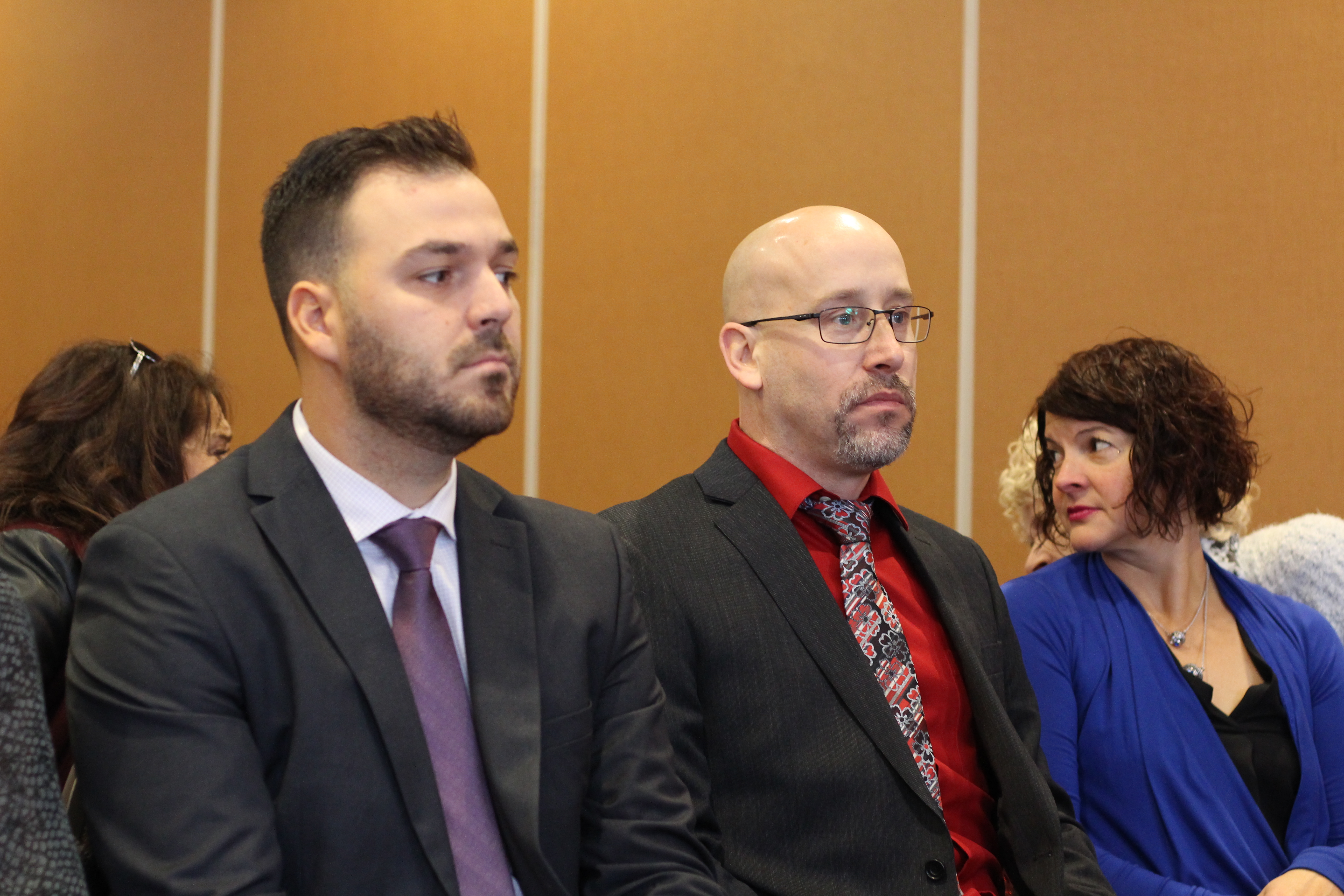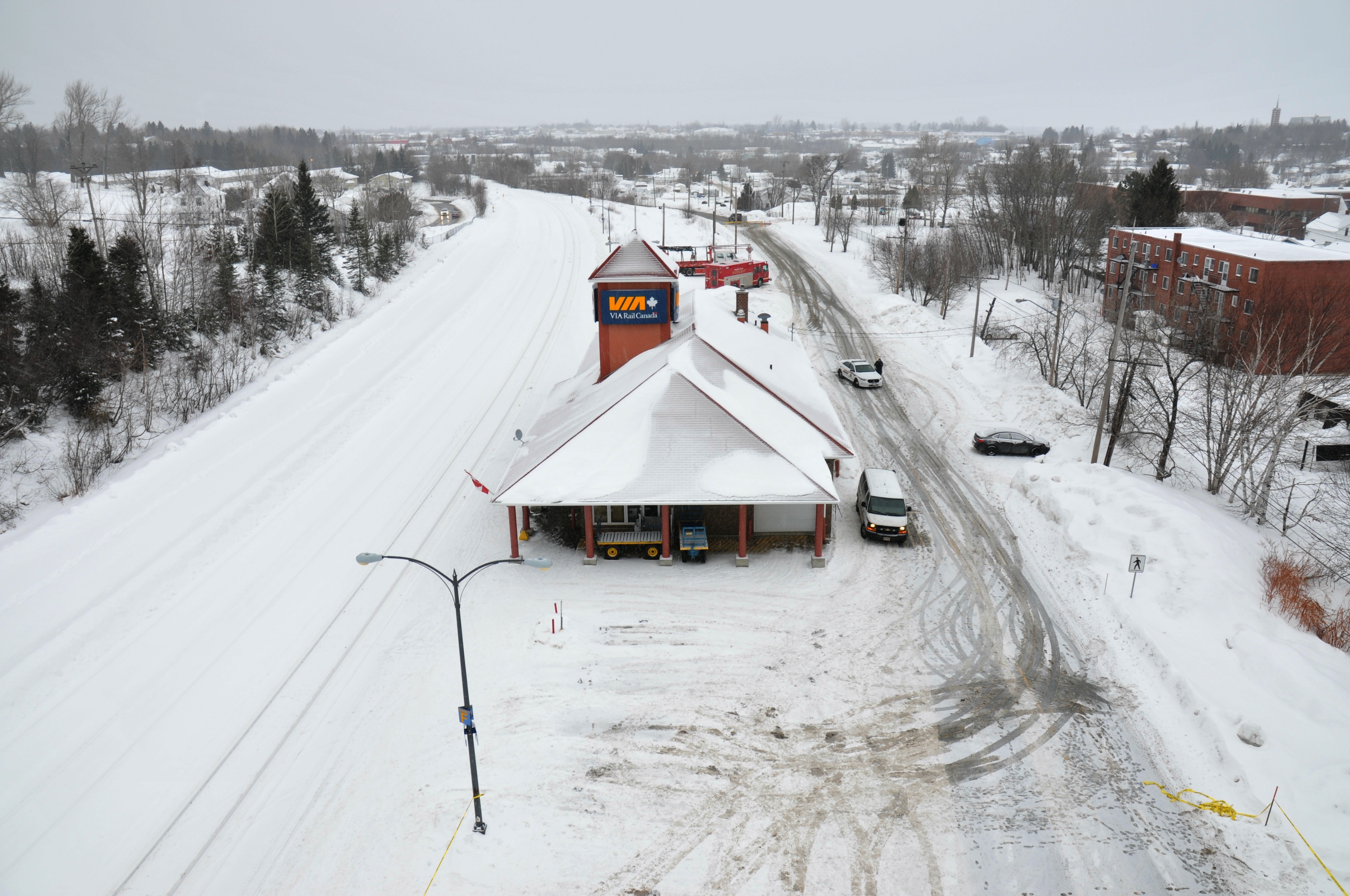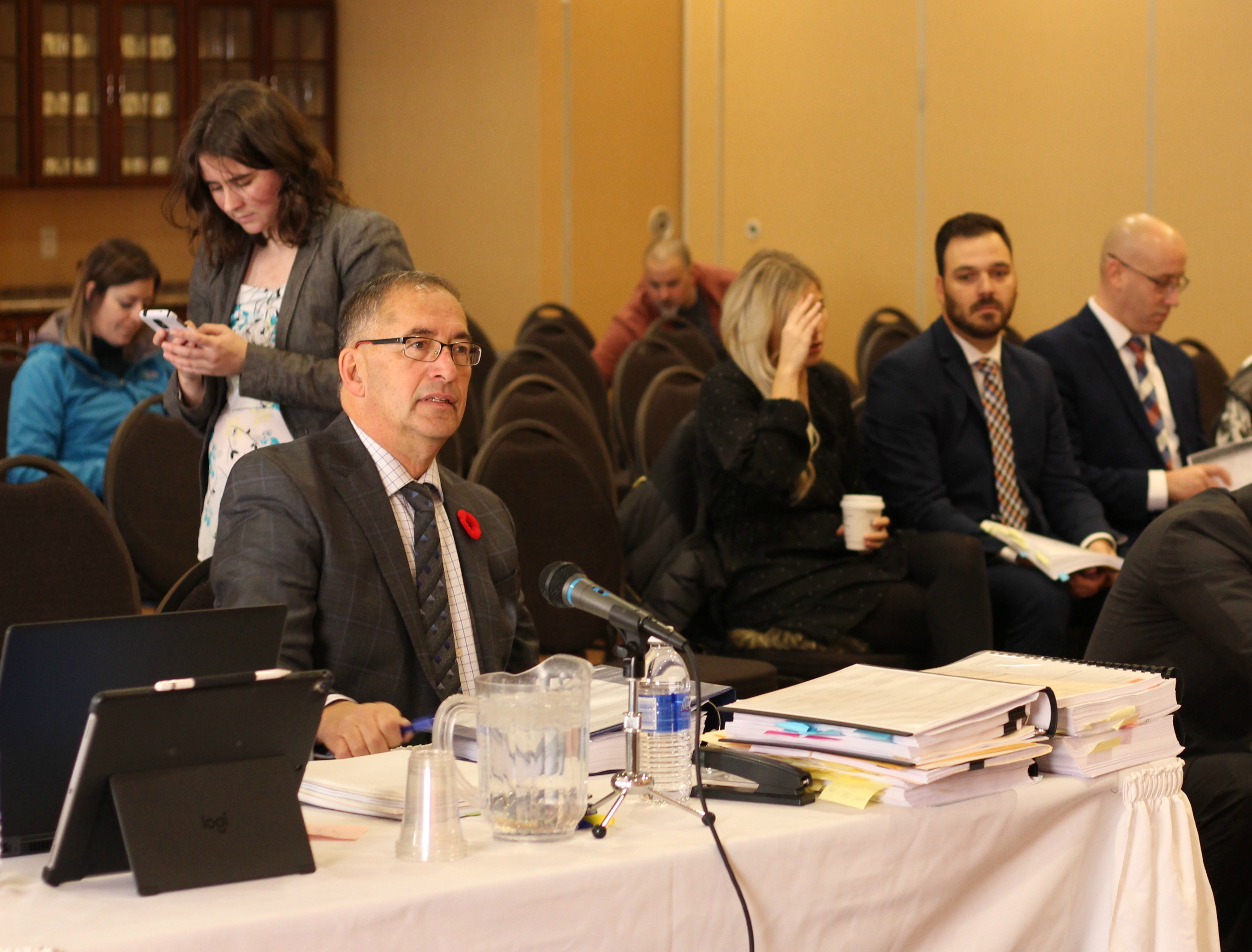December 7, 2019
Michel Vienneau stepped off a Via Rail train in Bathurst, N.B., an innocent man after a trip to Montreal with his fiancée to watch a hockey game. He didn’t know six undercover police officers were waiting for him.
Anonymous tips led police to believe Vienneau and Annick Basque were trafficking drugs, and they hastily arranged an operation to intercept the Tracadie couple.
What unfolded Jan. 12, 2015, in the snowy train station parking lot, left Vienneau dead.
Since then, the split-second decisions made that day have been the subject of a criminal investigation, a police discipline hearing and a civil lawsuit and will be examined at a future coroner’s inquest.
This story pieces together what happened based on more than a dozen witness accounts and police records.
The tips
For the officers of the Northeast Integrated Intelligence Unit, the day began with paperwork and sifting through emails. The unit, now disbanded, brought together a handful of officers from regional police forces in a Bathurst office for surveillance and intelligence gathering related to drugs and organized crime.
The work usually involved talking to sources, checking on tips and observing suspects. Cases built by the unit were normally handed off to a partner police force to carry out searches or make arrests.
At 9:53 a.m., the day changed when RCMP Sgt. Ron DeSilva, the unit’s supervisor, opened a tip received through Crime Stoppers.
Someone reported Michel Vienneau and Annick Basque were travelling on the train from Montreal to Bathurst that morning with drugs. The tip said the train was to arrive at 8 a.m.
“You missed a load of drugs,” DeSilva told Const. Patrick Bulger and everyone else in the office.

Bulger and his partner Const. Mathieu Boudreau were members of the Bathurst Police Force drug unit, but had been specially assigned to the integrated unit in the fall of 2014.
Among the members of the team, Boudreau was the least experienced. He and Bulger were considered promising officers and had stellar workplace reviews, with no prior use-of-force issues, the reviews entered as evidence indicate.
A second anonymous Crime Stoppers tip soon followed. It was more detailed, indicating Vienneau and Basque were drinking on the train and accusing them of trafficking an unspecified quantity of “pills.”
Officers testified that could have meant anywhere from 300 to 10,000 pills. What kind of pills wasn’t clear.
Together, the tips offered specific names and ages and a description of Vienneau’s vehicle.
“It wasn’t a far-fetched tip.”
The reference to Montreal, considered to be a trafficking hotbed by the unit’s members, added to the tips' credibility, the officers would later say. A confidential informant had previously told police the train was being used to move drugs.
“It wasn’t a far-fetched tip,” DeSilva testified at the discipline hearing this year.
Little is known about the exact wording of the tips, the source and motivation for submitting them, or whether they were written or called in. The tips have since been sealed by a court order.
Bulger called the Via Rail station. The train wasn’t due until 10:30 a.m. They could still intercept Vienneau, but there wasn’t much time.

DeSilva testified during criminal proceedings that he didn’t give any directions to Bulger as he and Boudreau prepared to head out.
But DeSilva told Const. Larry Matchett from the Miramichi police, Const. Denis Lajoie of the RCMP and Sgt. George Richard of the BNPP regional police to assist them at the train station.
Matchett immediately went to the train station. Richard searched a motor vehicle database for Vienneau and found his licence, a photo and vehicle registration information.
Richard said Crime Stoppers tips can be helpful.
“It’s a starting point for an investigation,” he testified this year. “The information needs to be filtered, put to the test and further investigation must be done to show that it’s correct.”
Beyond a cursory search by DeSilva, no one searched for Vienneau or Basque in various police databases to see if they had any outstanding warrants or criminal records. Their names weren’t familiar to police.
No other steps to verify the tips were carried out before the officers left for the train station.

Before leaving the station, Boudreau stopped at the office of another Bathurst police unit and asked if anyone could assist them because one member of the intel unit was away that morning.
Const. Julie Daigle, Boudreau’s friend after the two went to police training together, offered to help. Her supervisor agreed.
DeSilva testified Bulger was the officer in charge of the rapidly organized operation. Given Bulger and Boudreau’s role with the Bathurst drug unit, officers in the unit said they viewed it as the pair's investigation.
DeSilva told the officers “not to get into a chase and to be safe,” a comment Boudreau took to suggest this wouldn’t be a surveillance operation. They were going to arrest Vienneau.
Bulger stopped and briefed Bathurst Sgt. Ernie Boudreau to ensure patrol officers avoided the train station that morning. They didn’t want marked police cars to blow the surveillance team’s cover.
The officers left the police station dressed in plainclothes, standard for the unit to avoid detection by people they surveil. They drove in unmarked police cars and SUVs that had hidden police lights.
If there were concerns among higher-ranking officers about what was happening, no one voiced them or stopped it.

The plan
Matchett, first to arrive at the train station, radioed that the white Chevrolet Cruze named in the tip was there. It had a light dusting of snow, suggesting it was there over the weekend.
Bulger and Boudreau, driving a grey Pontiac G6, parked facing the train tracks about one spot away from the Cruze.
Daigle parked in a driveway along Thornton Avenue that offered a view of Vienneau’s car, the Pontiac G6 and the station building. Bulger sent a photo of Vienneau to Daigle.
“PPT?” Daigle asked Bulger in a text, shorthand for the Criminal Code charge of possession for the purpose of trafficking. Yes, Bulger replied.
Matchett parked south of the station, while Richard and Lajoie parked to the north near a school. They were arrayed so some units could directly watch the train platform, while others were in a position to follow or stop Vienneau’s car.
Bulger radioed a plan for the officers parked around the station.
They would ensure Vienneau had all of his luggage before trying to intercept him. That meant they didn’t want to stop him before he got in his car because he might drive it closer to the station building to pick up more bags, which might contain drugs.

If they saw him start to drive south and away from the station, Boudreau would move the Pontiac to block the Cruze. Daigle would pull up to block it from behind.
If Vienneau started to go north, they’d wait until he was past the station to ensure he wouldn’t stop for more bags. Then Richard, Lajoie and Daigle would stop Vienneau.
In the Pontiac facing the tracks, Boudreau told Bulger he was nervous. While they waited for about an hour for the train to arrive, they had what Bulger and Boudreau described as limited conversation.
No other background checks were done as they waited.
Train ride home
Basque met Vienneau, the owner of an electronics store, while she worked at a Pizza Delight. They were engaged and had lived together in Tracadie, on the Acadian Peninsula, since 2011.
Vienneau loved the train, Basque has said, and they took the Via Rail train to Montreal on Jan. 9. They spent Saturday morning visiting places in the city where Vienneau grew up.
They were among 21,287 spectators at the Bell Centre on Jan. 10 who watched the Pittsburgh Penguins defeat the Montreal Canadiens 2-1.
Vienneau and Basque went to a bar after the game and spent Sunday visiting family in the city before heading to the train station to go back to Bathurst.
Vienneau took videos and photos during the trip, posting updates about their travels on Facebook. The couple bought a bottle of wine to drink with supper on the train Sunday evening as the train wound through Quebec.

At the station
It was overcast and –8 C when the train pulled into the Bathurst station around 11:20 a.m., delayed by a freight train.
The small, brown-brick station with a bright red roof is one of several short stops the train makes en route through New Brunswick to Halifax. No fence separates the platform and tracks from the adjacent parking lot along Thornton Avenue.
Bulger and Boudreau saw the couple leave the train and radioed to other officers updates about their movements.
Vienneau put a backpack with clothes into the trunk and brushed the snow off the car. Basque noticed two men in an older car parked nearby.
She said they appeared to be in the middle of an argument and stopped when she looked at them. Unsettled, she got in the Cruze.
Vienneau got in the car and started to reverse, planning to visit family. The Pontiac also started to back up and the vehicles came face-to-face on Thornton Avenue a few feet apart.

“My God, Michel, let them go by, they look to be more in a hurry than we are," Basque recalled saying.
Accounts of what unfolded over the following seconds differ, particularly between officers and civilian witnesses.
In the Pontiac, Bulger said he gave the order over the radio for Daigle to move on Vienneau.
Boudreau said he flicked on a small flashing police light in the car’s visor and another system that made its headlights strobe as the vehicles began to move.
"Are they crazy? They have a gun."
Bulger pulled out his police badge, on a chain around his neck, from under his clothes and body armour. He opened the passenger door and stepped out.
Wayne Coster and Joe Sutton were the engineers on the Via Rail train. They were also walking along the platform during the train’s 10-minute stop in Bathurst.
A commotion drew their attention to the station parking lot.
“Stop, stop, don't move, stay right there,” Sutton recalled hearing.
Bulger testified he yelled “Police, police, stop” as he exited the Pontiac. He said he could already hear the Cruze’s engine revving, its tires spinning.
He perceived it as a threat and unholstered his gun.
A rough recreation of what may have taken place at the train station on Jan. 12, 2015, based on testimony from witnesses at a police discipline hearing.
In the Cruze, Basque said she saw the passenger in the Pontiac get out with a gun, slip and fall. The Pontiac’s driver hit the wheel and didn't seem pleased the passenger got out, she said.
Boudreau exited the Pontiac just after Bulger, delayed by a buckled seatbelt. He said he drew his gun at the same time and heard the engine of the Cruze revving.
“Are they crazy? They have a gun,” Basque recalled saying. She said she couldn’t hear what the man was yelling. The car’s heater was going, windows were closed.
It was days after the Charlie Hebdo terrorist attack in Paris, and she thought she and Vienneau might be taken hostage. Vienneau forced her under the car's dashboard to protect her and started to drive.
"The car turned towards me, not stopping."
Bulger said the Cruze hit the police car and kept going.
"The car turned towards me, not stopping," Bulger said. As he backed up, the front of the Cruze hit his left knee and he pushed himself off the car, he said. Boudreau recalled seeing Bulger’s hand on the hood.
On the train platform, Gerald Jean of Petit-Rocher was helping his elderly mother get from the train to his car. He saw a man trying to get away from a white car before the car hit a snowbank. Sutton said he heard the man yell, then saw the white car move and hit a snowbank.

Bulger said he kept backing up away from the car until he said his back was against a snowbank. He testified he was lying on his right side, partially under the Cruze’s bumper, his feet close to a spinning tire.
Bulger heard several bangs but was worried if the car moved, he could be hit again. He fired at the car’s rear tire, which he missed. He said he was able to move before the car lurched farther into the snowbank.
"Without any hesitation, [a man] came up along the car and shot out the back driver's-side window."
Boudreau lost sight of his partner and feared he was under the car.
He fired his 9-mm Beretta pistol twice through the driver’s-side rear window from about four feet, or about 1.2 metres, away.
He paused a second to reassess, then fired twice more. The car then stopped moving, he said.
Basque said she heard gunshots before the car hit the snowbank.
Sutton said he heard the shots just before or as the car hit the snowbank.
Along the platform, Coster saw the car hit the snowbank. "Without any hesitation, [a man] came up along the car and shot out the back driver's-side window," Coster said. He heard a man yelling, "Get out of the car, get out of the car."

20 seconds
From the time the cars backed up to when she saw Boudreau firing, Daigle estimated 20 seconds passed.
The other officers waiting for Vienneau swarmed the Cruze. Daigle was the only one of them with her sidearm drawn. Richard testified there hadn’t been any discussion of using firearms as part of the arrest.
Three officers removed Vienneau from the Cruze. Several didn’t know there had been a shooting until they saw blood.
“I was kind of puzzled,” Richard testified. He walked over to Boudreau.
"That's when he told me he had a shooting," Richard said. "He was running over Const. Bulger, he had to shoot him."
Bulger, a former paramedic, began CPR on Vienneau. Lajoie, another former paramedic, joined him.
“What did you do to my man?” Basque yelled, asking the officers removing her from the car if they were really police.
She was arrested on suspicion of drug trafficking and driven away from the scene. She was later released and never charged.
Bulger and Lajoie went in the ambulance with Vienneau to the Chaleur Regional Hospital, where the 51-year-old was pronounced dead from a gunshot wound to the left side of his chest.

Within hours, the RCMP in Nova Scotia were called to perform an independent investigation of the shooting.
RCMP Insp. Larry Wilson led the investigation involving more than two dozen officers who spoke to about 100 witnesses.
CBC News obtained a heavily redacted copy of Wilson’s final report, called Project Harmon, through access to information requests.
The report says there was no surveillance video of the scene. With Vienneau dead and Basque having been pushed under the dash, the two officers are the only people who could describe the entire sequence of events at the station.
Wilson’s report concludes Vienneau may not have known Bulger and Boudreau were police officers when it says Vienneau purposely hit Bulger.
A flashing red and blue light bar clipped to the Pontiac’s sun visor was also likely hard to see, and flashing red and blue lights in the car’s headlights weren’t working. A system that made the headlights strobe was functioning, however.
A siren wasn’t activated — and when police tested it, they found it barely audible.

No evidence of drug trafficking
During a thorough investigation, including checking police databases in Quebec and searching Vienneau’s phone, RCMP found no evidence he or Basque had any criminal history or links.
No drugs were found.
The RCMP concluded the intel unit’s plan that day “was based solely on the Crime Stoppers tip.”
When Bulger and Boudreau approached the Cruze with guns drawn, the report says, Vienneau’s perspective “dramatically changed from a routine departure from the train station to a flight or fight situation.”
With the occupants of the car wrongly assuming they were under attack, and police wrongly assuming Vienneau was trying to evade arrest and hit Bulger, Boudreau opened fire.
"To put it bluntly, they created the whole mess.”
Ultimately, a use of force analysis prepared for the RCMP called Boudreau’s shooting of Vienneau “reasonable and necessary” in the circumstances to protect his partner’s life.
It was a situation provincial court Judge Anne Dugas-Horsman described as a “perfect storm of misjudgment and misinterpretation.”
Criminal charges against the officers were filed following the RCMP investigation but dropped after a preliminary inquiry, where Dugas-Horsman ruled there wasn’t evidence of a crime.

How Vienneau ended up dead after a weekend trip to Montreal to watch a hockey game is a question asked by the community, his family and, in October, lawyer Basile Chiasson.
Chiasson is representing the Bathurst police chief in a discipline hearing for Boudreau and Bulger. The degree of force used that day, Chiasson argued during the hearing, was neither required nor unavoidable.
"To put it bluntly, they created the whole mess,” Chiasson said.
T.J. Burke, a lawyer representing Boudreau, disagreed.
"Someone purposely tried to run over a police officer," Burke said.
The discipline hearing will determine whether the officers face any punishment. Arbitrator Joël Michaud is expected to issue a decision sometime after closing arguments on Dec. 9.
